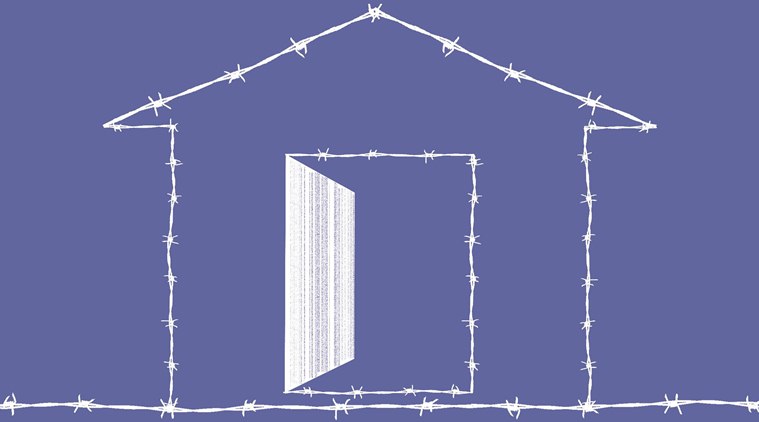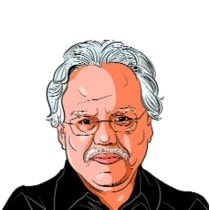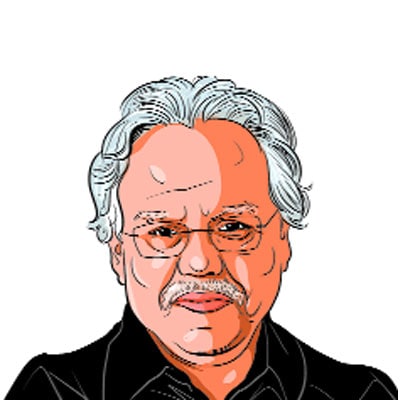India has displayed ample national self-confidence but it has not translated into good public policy
Winning the neighbourhood
India has displayed an ample supply of national self-confidence and pride in recent years. But the self-confidence has not translated into good public policy.

The proposed citizenship amendment bill may turn out to be the beginning of a major shift in India’s refugee policy. (Illustration: CR Sasikumar)
When it comes to trade relations with its immediate neighbours, India is strikingly different from other regionally-dominant major countries. Despite being the region’s largest and fastest growing economy, India absorbs as little as 1.7 per cent of Bangladesh’s exports, and accounts for only 14 per cent of its imports. Economist Ashok V Desai, who has pointed this out recently (The Telegraph, October 16), contrasts India’s trade profile with that of other regionally dominant countries such as the US vis-à-vis Canada and Mexico, the European Union vis-à-vis Poland and the Netherlands, and South Africa vis-à-vis Namibia and Mozambique. In order for India to achieve a similar trading position as those countries, Desai would like to see India take the initiative to free the movement of goods and people between India and Bangladesh. It not only makes eminent economic sense, he believes, it is quite practical. After all, India treats Bangladeshis as foreigners and has an “extremely costly infrastructure to prevent illegal immigration” from there. But Indian policy vis-à-vis another regional neighbour is not as economically dysfunctional: Nepalis are treated as “permissible aliens”.
How has the legal status of Nepalis and Bangladeshis come to be so different in post-colonial India? One would not necessarily have predicted this from past history. It hardly needs to be stated that the ties between present-day Bangladesh (eastern Bengal) and India in British colonial times were closer than those between India and Nepal. After all, both were part of the same political entity. Moreover, the district of Sylhet in Bangladesh was a part of the province of Assam; and for a brief period from 1905 to 1911, Eastern Bengal and Assam constituted a single province. But Nepal was not a part of British India. However, like the neighbouring Himalayan kingdoms of Bhutan and Sikkim, it was part of Britain’s informal empire.
During the British colonial period, migration across this entire region — whether from Bengal to Assam or from Nepal to India — was not only unrestricted, it was actively encouraged. Thus the ethnic Nepali population of Darjeeling district in West Bengal, Sikkim, parts of Northeast India as well as Bhutan is a legacy of the informal empire.
Decolonisation created a new territorial order in the region and it tried to bring a period of extraordinary mobility to an end. The illegality regimes created by newly-independent countries made the status of many people in the region — most importantly in India — suddenly more vulnerable.
There is nothing predetermined about the fact that the legal status of Nepalis in post-colonial India would be different from that of Bangladeshis. Ethnic Nepalis have had to struggle for this status; and in certain parts of India, they continue to feel quite vulnerable. Indeed, ethnic Nepali political mobilisation in the entire transnational region has been an effort to assert citizenship rights in response to a growing sense of post-colonial vulnerability. After all, nearly 1, 00,000 ethnic Nepalis of Bhutan or the Lhotshampas — southern Bhutanese in the Dzongkha language — were expelled from Bhutan in the 1990s.
Ethnic Nepalis form the social basis of the Gorkhaland movement in Darjeeling. Indeed, the use of the term Gorkha is itself a way of making claims to Indian citizenship, since it avoids confusion between citizens of Nepal and ethnic Nepali citizens of independent India inherent in the term Nepali.
But what are the chances of India making policies vis-à-vis Bangladeshis that are in India’s economic interest? The expectation that the NRC process would lead to a resolution of Assam’s long-festering citizenship crisis has now faded. The confrontational atmosphere building in Assam around the Citizenship Amendment Bill has eerie similarities with the Assam of the early 1980s. A group of Mumbai-based activists now describes the NRC updating process as the NRC crisis since it has led to 30 suicides so far.
Whatever else one can say about the Citizenship Amendment Bill, it is hard to argue that it will promote greater economic integration between India and Bangladesh. The distinction between Hindus and Muslims in India’s citizenship laws that the bill will introduce — albeit through the backdoor — would only make the situation worse for “Bangladeshis in Bangalore”, who in economist Desai’s words, “are treated as illegal immigrants and hounded”.
The proposed bill may turn out to be the beginning of a major shift in India’s refugee policy. Its closest international analogue may be the Cold-War era refugee policy of the US. From 1952 to 1980, the Cold War shaped the very definition of a refugee in US law. A refugee was defined as a person fleeing “from a Communist-dominated country or area”. Cubans became the biggest beneficiary of this policy because of the island nation’s proximity to the US.
Not unlike India’s Citizenship Amendment Bill, Cuban immigrants according to the Cuban Adjustment Act of 1966 could not be treated as illegal in the US. They qualified for US residency within a year of being in the US and were eligible for citizenship five years later, no matter how they entered the country. Since they were admitted for humanitarian reasons — allegedly for fleeing communist oppression — Cubans quickly became a significant immigrant group in the US. Within a decade after the Cuban Revolution of 1959, the Cuban population in the US grew by six-fold.
If the proposed amendment to India’s citizenship law is passed, it could stimulate a similar wave of emigration of Hindus from Bangladesh, perhaps from Pakistan and Afghanistan as well. The proposed amendment will, of course, limit refugee status and the road to citizenship, to those already in the country. But the history of immigration from the communist countries to the US during the Cold War suggests that signals are always very important in pushing modern emigration.
Former BJP leader Jaswant Singh, known for his strategic thinking, once said that “in considering the totality of national security, economic security is the pivot: Its vitality, growth and dynamism becomes the principal security imperative”. If one follows his insight, Desai’s recommendations should be very high on the ruling party’s policy agenda. But unfortunately, while the BJP-led government proclaims a foreign policy of “neighbourhood first”, the ruling party is also presided over by a president who talks of Bangladeshis as “termites” that are “eating the grain that should go to our poor and they are taking our jobs”.
The major reason why India cannot make the “vitality, growth and dynamism” of its economy a priority in its policy-making has to do with the country’s internal weaknesses and the ideological predilections of its ruling elite. India does not have the domestic political constituencies to back the kind of policies that Desai proposes. Nor is there willingness on the part of the ruling elites to invest in creating potential constituencies to make its immigration and refugee policies compatible with India’s economic aspirations.
India in recent years has displayed an ample supply of national self-confidence, pride, and perhaps even some hubris. Unfortunately, there is no straight-line between self-confidence and good public policy.
The writer is Professor of Political Studies in Bard College, New York.
For all the latest Opinion News, download Indian Express App
More From Sanjib Baruah
- The missing 4,007,707Can a democracy permit so many to be in a state of liminal legality? NRC poses a political and moral question ..
- A lesson from Arunachal PradeshDebate over the state’s anti-conversion law points to the need to give more attention to religious change from the perspective of the ‘converted’...
- Citizens, non-citizens, minoritiesUpdating of the National Register of Citizens in Assam and the Citizenship Amendment Bill could lead to a redrawing of the demographic map of South…








































No hay comentarios:
Publicar un comentario